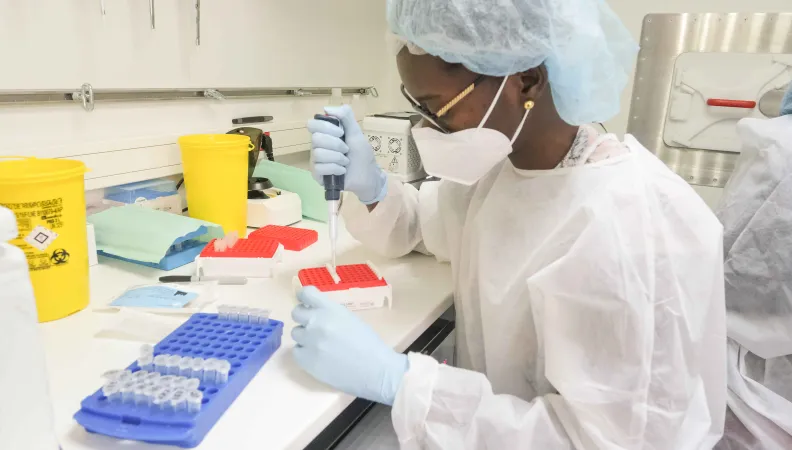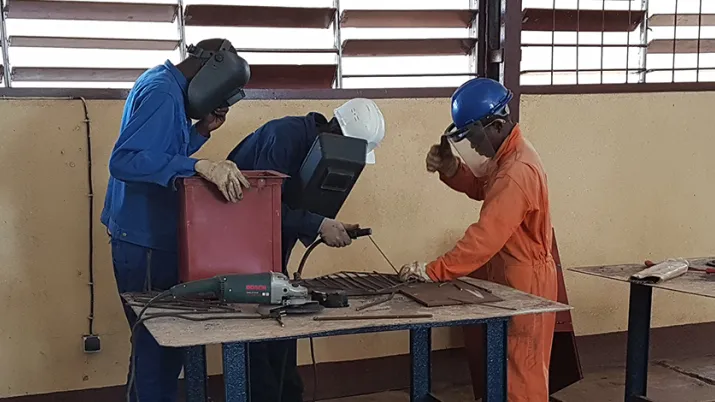Share the page
G7GP Senegal: Characterising strains of biological agents of interest
Project
Published on

-
Project start date
-
Status
Ongoing
-
Project end date
-
-
Financing amount (Euro)
-
0.35m
-
Country and region
-
Senegal, Africa
-
Funders


The G7GP Senegal project aims to characterise strains of biological agents of interest through a microbiological, molecular and genetic approach.
The endemic circulation of bacteria in West Africa
The West Africa region is endemic for numerous biological agents of interest, in particular bacterial, such as the Bacillus cereus group, which is naturally present in the environment and has high pathogenic potential for humans and animals. Plant-based foods, such as rice, vegetables, potatoes and spices, are the most common source of contamination.
Senegal is a country with an epidemiological situation characterised by the endemic circulation of several important bacteria and viruses for public health and food security. These pathogens pose a risk not only to human health, but also to agriculture and food systems. To anticipate epidemics and strengthen local response capabilities, it is essential to understand their distribution, evolution and mode of transmission. The ecological, climatic and social environment also fosters the emergence or re-emergence of certain infectious agents in this region.
A project to improve knowledge of biological agents
The G7GP Senegal project aims to enhancemutual knowledge of biological agents and the development of methods to analyse and identify biological agents of interest. It involves characterising the biological agents, conducting bioinformatic and phylogenetic analyses, developing protocols for the detection and identification of biological agents, exchanging biological materials and resources, and setting up containment laboratories.
In addition to the production of scientific data, this project aims to strengthen partnerships between Senegalese and French institutions, and promote the transfer of skills and technologies. It is contributing to the creation of shared databases, the development of detection kits suited to local conditions, and the improvement of biosecurity practices. By training personnel, organising joint missions and publishing collective results, the project aims to permanently structure a response to biological threats.
An in-depth characterisation of biological agents
To begin the work on this project, veterinarians from the National Livestock and Veterinary Research Laboratory (LNERV) had the opportunity to undertake a field visit to collect strains of interest for an in-depth characterisation of them.
The capabilities of these veterinarians will ultimately be strengthened, in particular for protocols on environmental samples, the molecular characterisation of strains, and in bioinformatics. They will in particular be trained in the isolation of strains of Bacillus anthracis, which will be followed by a phenotypic analysis of them.
This work will evidence the genetic and phenotypic diversity of the isolated agents, identify atypical strains, and enable the diagnostic tools to be adapted to local situations.
The pathogens will be studied using advanced techniques, such as next-generation sequencing, MLVA typing, and spectrometric analyses.
In virology, the main focus will be poxviruses, as well as other endemic viruses of interest for biodefence, such as arboviruses, filoviruses, and certain viruses originating from bats, for which Senegal is a natural ecological reservoir.
Sustainable Development Goals
SDG3 - Good health and well-being
Ensure healthy lives and promote well-being for all at all ages

SDG16 - Peace, justice and strong institutions
Promote just, peaceful and inclusive societies

Our projects in Senegal
SecFin Africa
Ongoing
2024 - 2028
Funders : European Union, German State, Ministry of Economics, Finance and Industrial and Digital Sovereignty of France, Ministry for Europe and Foreign Affairs of France





